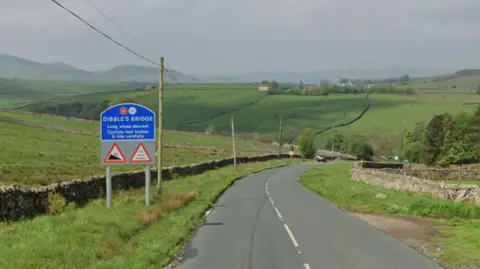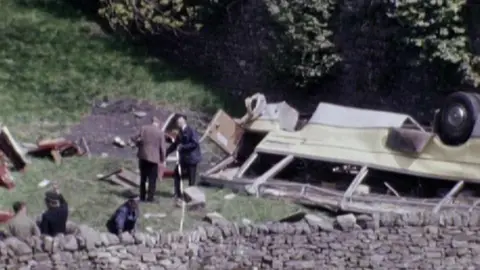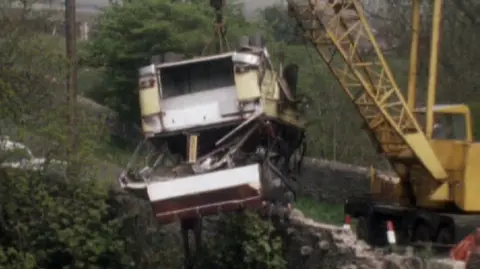'They laid the bodies out in our garden' - 50 years since Dibbles Bridge crash
 Google
GoogleFifty years since a coach crash in which 32 pensioners and their driver died, the man who was first on the scene still remembers a day that shattered the peace of a remote corner of the Yorkshire Dales.
Lincoln Seligman was 25 and holidaying at his in-laws' cottage in Hebden with his wife when the coach landed in their garden on 27 May 1975.
Its brakes had failed on a notorious descent known as Dibbles Bridge.
"I had never seen a dead body before and suddenly there were 33," he says. "Eventually they were all stacked up or laid out in the garden.
"All you could hear was the sort of ticking of the engine, which was hot. The driver had come partially through the windscreen.
"One just takes in the situation as it is and then you wonder what comes next, but it was pretty quiet."

Forty-five mostly elderly women were on a day trip from Thornaby-on-Tees to the tourist honeypot of Grassington when the coach they were travelling in careered down a steep bank and landed on its roof. Only 13 passengers survived, making it the worst UK road accident by death toll.
Mr Seligman, now 75, says it took at least an hour for the emergency services to arrive – as the rural holiday cottage had no telephone and they had to wait for a local farmer to call for help.
Just one ambulance with a single driver arrived at first before the scale of the tragedy became clear, and the injured were taken to Airedale Hospital in Keighley rather than Leeds and Newcastle, which nowadays have major trauma centres.
"My wife and I were there on our own for most of that time and three boy Scouts who are now in their 60s were there too.
"It was pretty hard to get anybody out because it was a very old coach and the windows were crushed anyway, so to get anybody out was almost impossible.
"When the emergency services turned up, I don't think they had anything like lifting gear, so they were pretty much in the same situation as us.
"I think the ones who were pulled out were the ones who made most noise and were probably the youngest.
"We did what we could but there was not much we could do."
 Lincoln Seligman
Lincoln SeligmanAn inquest in July 1975 found the main cause of loss of life was the crushing of the victims between the seats.
It concluded that the 45-seat Bedford/Duple coach belonging to Riley's Luxury Coaches crashed through Dibbles Bridge at the bottom of Finchale Hill, falling 16 to 17ft.
According to the archives of Commercial Motor magazine, a passenger giving evidence from a wheelchair said when the coach started going downhill it went "faster and faster and the driver swore".
Dorothy White, 62, organised the Yorkshire Dales visit. She had been running trips - known as "Auntie Dorrie's mystery trips" - for 30 years.
The owner of the coach company, Norman William Riley, 51, pleaded guilty to using a motor vehicle on which the braking system was not maintained in efficient working order and was fined just £75.
The incident led to a tightening of safety measure for commercial coaches, including the inspection of braking systems on public service vehicles, and the introduction of brake retarders.
Years later, in March 2021, a warning sign was erected on the road above Dibbles Bridge following a further three fatal crashes involving cyclists who had lost control and fallen over the parapet.
James Nelson, 32, was riding with Skipton Cycling Club when his brakes locked on the descent and he fell into the river below in 2014.
A year later, Leeds General Infirmary cardiologist Dr George Ballard, 41, from Ilkley, fell 50ft into the River Dibb after he collided with the bridge and was thrown over the handlebars.
And in 2020, American engineer Craig Barnhart, 66, fell from height from the stretch of road after the brakes on his e-bike failed.
Safety barriers have since been erected.
Keith McNally, operations director at the Confederation of Passenger Transport UK, says he does not think the incident would happen again because of a series of changes in the law.
He said: "A whole load of things have changed since then, the way vehicles are maintained, driver training, anti-lock braking systems - which you didn't have in those days - and they didn't have an annual MOT.
"The primary problem in this incident was that the brakes didn't work effectively.
"They didn't have retarders at that time, and the retarder in effect takes the pressure off the brakes so there's resistance to the vehicle going down the hill before you actually use the brakes.
"Even if it did happen and went over the the wall as it did, the vehicle wouldn't collapse in the way that it did because of rollover protection.
"Vehicles are much stronger and they're designed to be able to roll over and still keep their structural integrity effectively."
The Driving Standards Agency's director of enforcement services, Marian Kitson, agrees, adding: "Effective and regular maintenance of buses and coaches is absolutely vital for public safety and the terrible crash at Dibbles Bridge still serves as a reminder 50 years on.
"In the time that's passed since this incident, standards in bus and coach manufacturing and maintenance have improved significantly."

Thornaby town councillor Tina Large was 13 when the incident hit her own family. Her great-aunt had set off on the coach trip that morning.
"I just remember my mam coming and getting us all to go to my uncle Tony's, which was my aunt Margaret's house, and we all had to go upstairs and everyone was coming round and crying," she says.
"I was about 13, and it was just devastating to have lost someone. Even until today, Auntie Margaret still talks about her.
"She was a lovely, lovely jolly person."
The incident lives large in the memories of people in Thornaby, and a memorial stone – which comes from a quarry near Hebden - sits in the town centre.
"Everybody was over the moon about the Dibbles Bridge memorial at the town hall. It's something that needs to be remembered," says Ms Large.
The last of the 13 survivors of the crash had died by 2022.
"Someone's got to carry it on and remember these people. I take my grandkids down there and they are fascinated by it and tell the school about it. So hopefully it's carried on generation to generation."
Listen to highlights from North Yorkshire on BBC Sounds, catch up with the latest episode of Look North.
